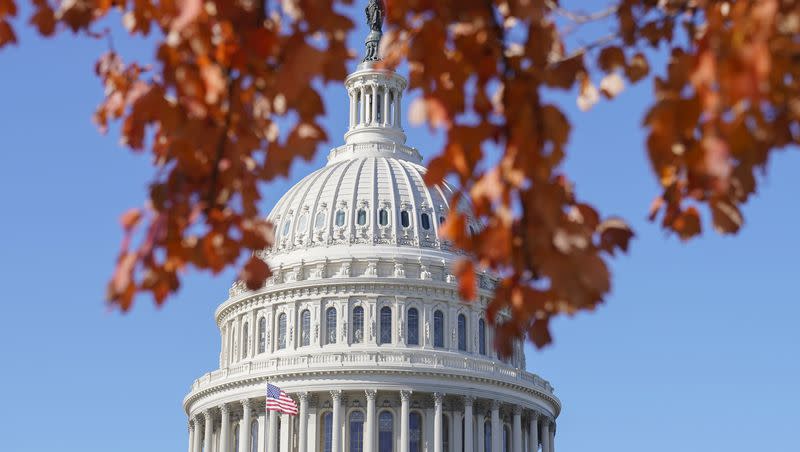The House is back in business, just in time for a fall shutdown

- Oops!Something went wrong.Please try again later.
- Oops!Something went wrong.Please try again later.
- Oops!Something went wrong.Please try again later.
Relief washed over House Republicans this week as they were finally able to move forward on policy priorities after almost a month of House Speaker stalemate.
“Where we are today with a speaker, I can’t speak enough about what that means to us,” Utah Republican Rep. Burgess Owens told the Deseret News on Wednesday. “It was a really tough three weeks, a lot of emotions.”
The unanimous Republican nomination and election of House Speaker Mike Johnson marked a turning point for the fractious GOP conference, according to Owens, who has already seen some of his own bills pass the House since the Louisiana congressman, known for his staunch social conservatism and “Stop the Steal” legal theories, took the speaker’s gavel last week.
Related
“For us to come together voluntarily to support one person speaks to how we are unified, in how we’re trusting of a speaker and we can now move forward and really get to work with the people’s work versus all the other internal stuff that we were going through for so long,” Owens said.
But whatever unity may have emerged among GOP lawmakers following the speaker’s race will be put to the test as Congress faces an imposing set of challenges in coming days and weeks, including squaring Israel and Ukraine aid and avoiding a government shutdown on Nov. 18.
What has the House done since getting a speaker?
After failing to pass even half of Congress’ 12 annual spending bills before the end of the fiscal year on Sept. 30, former House Speaker Kevin McCarthy pushed back the deadline 45 days — a decision that required bipartisan support and resulted in McCarthy’s removal.
House lawmakers burnt through the next three weeks nominating and then rejecting speaker’s candidates until exhaustion, and the right personality, prevailed
Related
Since his election on Oct. 25, Johnson has moved quickly, adopting a resolution in support of Israel, passing $14 billion in Israel aid paired with spend cuts to the Internal Revenue Service and sending two more appropriations bills — funding the legislative branch and several federal agencies — to the Senate.
Continuing a theme from McCarthy’s tenure, the bills brought to the floor by Johnson have consisted of uncompromising conservative policies that have already been declared dead on arrival in the Democrat-led Senate, which has started working on its own versions of the spending and foreign aid bills, likely forcing House members to eventually vote on the Senate legislation instead of amended bills that originated in the House.
However, Johnson hopes to break from the pattern set by his predecessor, by passing a short-term spending bill that extends federal funding, and avoids a shutdown, through mid January, Punchbowl News reports, something conservative Republicans seem more willing to accept under Johnson’s leadership.
What role did Utah’s members of the House play?
With the House reopened for business, Utah’s three House lawmakers have seen progress on bills they have sponsored or cosponsored.
Related
Rep. Burgess Owens, Sen. Mitt Romney look for ways to counter antisemitism on college campuses
House passes $14.3 billion in aid for Israel, but Biden has said he’ll veto Israel-only bill
Rep. Burgess Owens, who represents Utah’s 4th Congressional District, has had a busy few days. On Thursday, Owens saw the passage of his resolution condemning support for Hamas, and other terrorist organizations, on college campuses. The resolution was approved with broad bipartisan backing.
Owens also saw the inclusion of one of his amendments in the Department of the Interior, Environment, and Related Agencies Appropriations Act. The amendment would defund the implementation of Biden Administration recommendations on mining.
As it stands, Department of the Interior appropriations bill contains several million dollars in power and water infrastructure funding for Salt Lake County and other areas in Utah.
Rep. Blake Moore, who represents Utah’s 1st Congressional District, introduced a new bill on Wednesday easing overtime requirements for outdoor recreation companies. Moore, along with Curtis, was also a cosponsor on Owens’ bill countering antisemitism at American universities.
Rep. John Curtis, who represents Utah’s 3rd Congressional District, cosponsored one bill that passed the House, imposing sanctions on Hamas, and cosponsored another that was introduced on Wednesday, requiring the Biden Administration to impose sanctions against groups that handle oil products originating in Iran.

